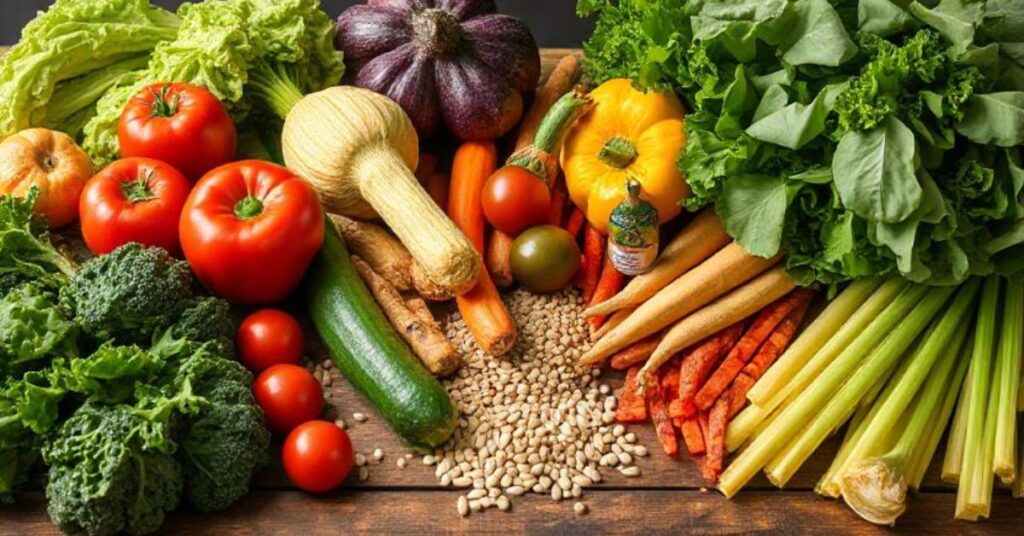Maintaining a healthy diet while adhering to Halal principles is important but can be challenging. As a Muslim, it’s crucial to find halal food that not only aligns with our beliefs but also supports our health goals.
The key is to incorporate healthy meals that cater to both our dietary preferences and body type, making sure to include wholesome foods that provide essential nutrients. One of the biggest hurdles we face is ensuring that our meals are quick and easy, so meal prep is minimized and precious hours in a busy schedule are saved.
A Halal lifestyle is more than just about eating; it’s about making informed choices that benefit both the body and mind. By choosing the right food elements, like fresh ingredients, and planning meals around fitness goals, we can achieve the balance between health and religious practices.
Weight loss or muscle building goals can easily be supported by a properly structured meal plan. With this approach, a balanced diet becomes achievable, aligning with the Halal diet and making it possible to reach personal health milestones effectively.
7 Basic Foods in Halal Diet Plans

Halal diet plans may have some restrictions, but they still include plenty of healthy and tasty foods. All you need to do is match the right foods with your daily routine and personal health goals.
A Halal diet plan consists of:
- Vegetables
- Fruits
- Whole grains
- Lean Proteins
- Healthy fats
- Meat
- Seafood
These 7 foods are not only important for Halal diet plans, but they are also recommended by the World Health Organization (WHO). According to the WHO, these foods are excellent for making sure that your body gets all the necessary micronutrients it needs, helping to prevent any nutritional gaps or deficiencies. Including these in your diet can help keep you healthy and balanced.
You might also like: The Best Dua for Travelling
1. Halal Diet Plan for Weight Loss
Losing stubborn weight can seem like an insurmountable challenge, especially as we get older. Many of us turn to personal trainers or low-calorie meals, but there’s another option that aligns with our faith: a week-long halal diet plan.
If it’s your first time trying to lose weight, creating a plan that focuses on shifting to healthier food choices is key. Instead of relying on unhealthy fast foods or halal meal delivery services, focus on losing weight by cutting out processed snacks and embracing a diet filled with fresh, nutritious foods.
Favourite apps can help track your progress, and by sticking to your halal diet plan, you’ll be well on your way to dropping pounds and feeling great. It’s about making small, consistent changes to get started on the path to better health.
Breakfast:
A bowl of Greek yogurt topped with fresh berries and a sprinkle of granola, alongside scrambled eggs with spinach and a slice of whole-wheat toast, for a nutritious and well-rounded meal.
Lunch:
A comforting bowl of chicken or lentil soup served with a refreshing side salad, followed by a tuna salad sandwich on whole-wheat bread with lettuce and tomato for a satisfying and balanced meal.
Dinner:
Baked cod paired with roasted vegetables, alongside a flavorful chicken stir-fry with brown rice noodles and a mix of fresh vegetables, makes for a healthy and delicious meal.
Snacks:
Fresh fruits with a sprinkle of cinnamon, vegetable sticks served with creamy hummus, and a small handful of crunchy almonds for a healthy and satisfying snack.
2. Halal Diet Plan for Building Muscle

To gain muscle, a Halal diet plan is essential, focusing on protein and complex carbohydrates for sustained energy. This plan requires a calorie surplus to fuel your body alongside strength training, ensuring you have the energy needed for consistent progress. By incorporating these nutrients, you’ll support muscle growth effectively.
Breakfast:
A bowl of Greek yogurt topped with fresh berries, chopped nuts, and a little honey for sweetness. On the side, enjoy scrambled eggs with spinach and a slice of whole-wheat toast spread with creamy avocado for a healthy and filling breakfast.
Lunch:
Grilled chicken breast served with fluffy brown rice and a side of roasted vegetables for a nutritious meal. Enjoy a warm bowl of lentil soup alongside a piece of soft whole-wheat pita bread for a complete and satisfying dish.
Dinner:
Baked salmon served with quinoa and crispy roasted Brussels sprouts for a healthy meal. A delicious beef stir-fry with fresh vegetables and brown rice noodles completes the dish for a nutritious and filling option.
Snacks:
A healthy snack of dates paired with crunchy almonds, along with a protein smoothie made with banana and spinach. On the side, enjoy fresh sliced vegetables dipped in creamy hummus for a balanced and satisfying treat. For a well-rounded Halal diet plan, focus on protein choices like chicken, fish, eggs, lentils, lean ground beef, and lamb.
Pair them with healthy carb choices such as brown rice, quinoa, whole-wheat bread, sweet potato, and whole-wheat pasta to provide sustained energy. Incorporating a variety of these ingredients ensures a balanced diet that supports both muscle growth and overall health.
3. Halal Diet Plan for Weight Management
Breakfast
Start your day with a healthy, filling breakfast that keeps you energized. A great option is oatmeal with chopped fruit, nuts, and a sprinkle of cinnamon. You can also enjoy whole-wheat pancakes topped with ricotta cheese, berries, and a little maple syrup for a sweet yet balanced start.
Lunch
For lunch, enjoy a satisfying meal with grilled chicken breast in a sandwich made from whole-wheat bread and filled with avocado and tomatoes. Another option is a fresh tuna salad with mixed greens and a light olive oil dressing to keep you full and nourished.
Dinner
For dinner, choose a hearty but healthy dish like baked salmon served with roasted asparagus and quinoa. You can also enjoy lentil soup with a side of whole-wheat roll and a side salad with vinaigrette dressing for extra flavor and nutrients.
Snacks
Snacks are important to maintain energy levels throughout the day. You can munch on fruits paired with a handful of almonds or enjoy sliced vegetables with hummus. For a more filling option, have some Greek yogurt topped with berries and chia seeds for added nutrients.
You might also like: Dua For Going To Sleep
4. Halal Diet the Energizer Plan
Breakfast
Start your day with a whole-wheat toast topped with scrambled eggs and avocado. Pair it with a side of spinach and a bowl of chia pudding made with almond milk and topped with fresh berries. This balanced breakfast will keep you energized with 400-450 calories.
Lunch
For lunch, enjoy a chicken breast sandwich on whole-wheat bread with mixed greens, tomato, and avocado. You can also have a hearty bowl of lentil soup with a whole-wheat roll and a fresh side salad for an additional 450-500 calories. It’s light yet filling, perfect for staying energized through the afternoon.
Dinner
Dinner options include baked salmon served with roasted sweet potato and broccoli or a delicious turkey stir-fry with brown rice and a mix of vegetables. Each meal is 500-550 calories, offering a satisfying, nutritious end to the day.
Snacks
For a healthy snack, opt for fruits like bananas or apples paired with a handful of almonds. Another great option is vegetable sticks with hummus or a protein smoothie made with banana and spinach. These options are around 150-200 calories, providing a quick energy boost when needed.
5. Halal Diet Plan for Vegans
For some Muslims, following a vegan diet can be a choice due to health concerns or as a temporary meat detox. While finding a week-long diet plan that excludes meat, fish, eggs, and dairy can be tricky, there are plenty of resources and information available online. This halal plan offers a Monday through Sunday plan that meets dietary needs without compromising on health or religious guidelines.
Breakfast
For a healthy start to your day, enjoy a smoothie made with plant-based protein powder, spinach, banana, and almond milk. Pair it with a slice of whole-wheat toast topped with mashed avocado and a sprinkle of hemp seeds for added nutrition. This combination provides both protein and complex carbohydrates for sustained energy.
Lunch
A wholesome lentil soup with a side of whole-wheat pita bread makes a hearty lunch. Alternatively, a chickpea buddha bowl with brown rice, roasted vegetables, and a drizzle of tahini dressing offers a delicious plant-based option, ensuring you’re getting plenty of nutrients from lentils, beans, and seeds.
Dinner
For dinner, you can enjoy baked tofu paired with quinoa and roasted Brussels sprouts for a filling meal. Or, opt for a veggie burger on a whole-wheat bun with a side of sweet potato fries for a satisfying, plant-based dish that is rich in complex carbohydrates and protein.
Snacks
Keep your energy up with healthy snacks like trail mix containing nuts, seeds, and dried fruit. You can also enjoy roasted chickpeas with spices or edamame with a sprinkle of sea salt. These snacks are great for satisfying your hunger between meals while providing essential nutrients.
Qamar Ul Haq is an Islamic historian and writer with a passion for uncovering the rich heritage of Muslim civilizations. Through in-depth research and storytelling, He brings to life the achievements, struggles, and contributions of the Ummah throughout history.